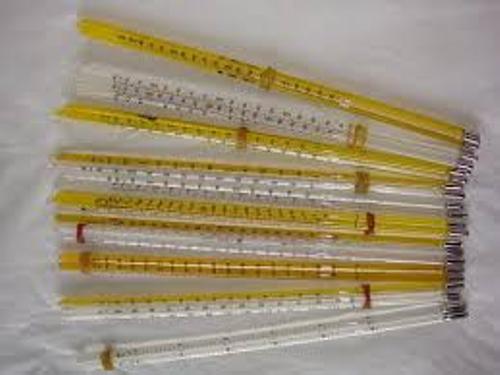Facts about Laboratory Thermometer talk about one of the important tools used in laboratory experiments. People recognize it as a tool to measure the temperature gradient or temperature. Thermometers are always employed in the scientific research, medicine and the study of weather. It features a temperature, which detects the physical change and converts it into the numerical value. Let us check other interesting facts about laboratory thermometers below:
Facts about Laboratory Thermometer 1: the principles of thermometers
Thermometers work in different ways depending on the principles applied in the tools. It may detect the change of pressure of gas when it is cooled or heated. Some thermometers detect the changes of thermal expansion of liquids or solids.

laboratory thermometer pictures
Facts about Laboratory Thermometer 2: the radiation type thermometers
Measuring the temperature can be conducted without any contact by using the radiation type thermometer. It radiates the infrared energy to detect the temperature.
Facts about Laboratory Thermometer 3: mercury
Mercury is often used in the laboratory thermometer because it has unique physical properties. When mercury is kept at room temperature, it has liquid state. The other metals will have the solid state at room temperature. Moreover, mercury owns the high coefficient of expansion. When you use thermometer, a small change in temperature will be seen.
Facts about Laboratory Thermometer 4: the modern laboratory thermometer
In 17th and 18th centuries, people realized the regulation of modern laboratory thermometer. Actually, it was the developed version of the thermoscope.

laboratory thermometer types
Facts about Laboratory Thermometer 5: scale
The laboratory thermometers should have an agreed scale if you want to have all read the similar temperature.
Facts about Laboratory Thermometer 6: the today’s scale
The International Temperature Scale of 1990 is applied as the current official temperature scale.

laboratory thermometer
Facts about Laboratory Thermometer 7: the invention of thermometer
Hero of Alexandria took the credit as the inventor of the earliest known thermometer.
Facts about Laboratory Thermometer 8: the development
In 16th and 17th century, the laboratory thermometer was developed from the previous one. One of the notable scientists, which contributed to the development, was Galileo Galilei.
Facts about Laboratory Thermometer 9: thermoscope and thermometer
What is the difference of thermometer and thermoscope? The former one features the scale.

facts about laboratory thermometer
Facts about Laboratory Thermometer 10: the types of thermometer
There are many types of thermometers. They include thermocouples, Six’s thermometers, mercury-in-glass thermometers, infrared thermometers, thermistors, Bi-metallic stemmed thermometers, recording thermometers, and liquid crystal thermometers.
Do you have any opinion on facts about laboratory thermometers?






